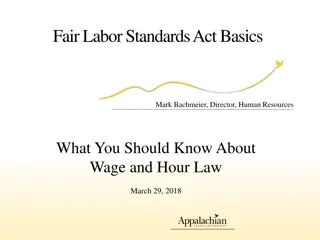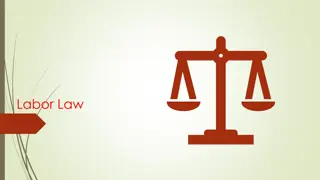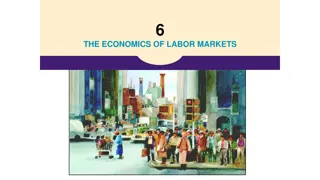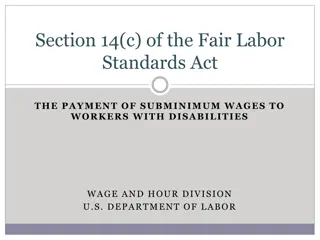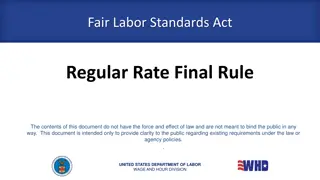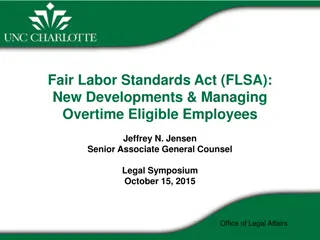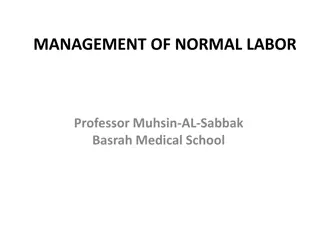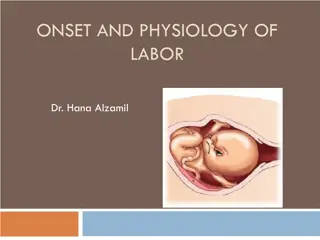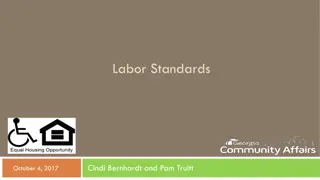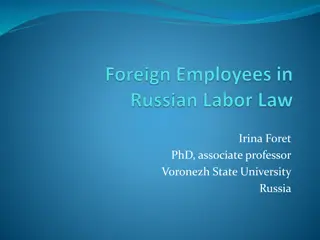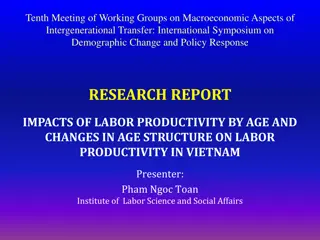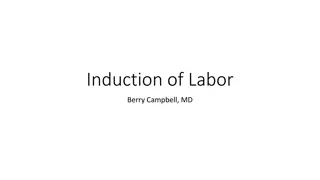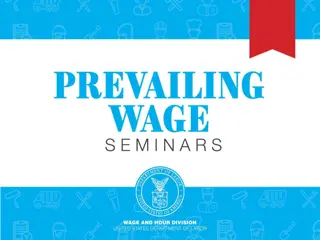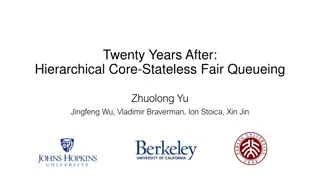Fair Labor Standards Act Overview for Principals
The Fair Labor Standards Act (FLSA) sets guidelines for paying employees, including principals and support staff, outlining exemptions, work schedules, and overtime rules in JP schools.
Download Presentation

Please find below an Image/Link to download the presentation.
The content on the website is provided AS IS for your information and personal use only. It may not be sold, licensed, or shared on other websites without obtaining consent from the author.If you encounter any issues during the download, it is possible that the publisher has removed the file from their server.
You are allowed to download the files provided on this website for personal or commercial use, subject to the condition that they are used lawfully. All files are the property of their respective owners.
The content on the website is provided AS IS for your information and personal use only. It may not be sold, licensed, or shared on other websites without obtaining consent from the author.
E N D
Presentation Transcript
FAIR LABOR STANDARDS ACT FOR PRINCIPALS
Fair Labor Standards Act Requires employers to pay non-exempt employees at least federal minimum wage for all hours worked up to 40 and time and a half for hours worked over 40 in a workweek. Hours worked = all time an employee is on duty and any time an employee is allowed to work. Overtime after 40 hours in a workweek = 1 the employee s regular rate of pay ( RROP )
JP Employees Exempt from FLSA Overtime Requirements Exempt - Executive, administrative, and professional employees are exempt from the overtime pay requirements if their job duties and salary meet the exemption rules under the FLSA. The following are categories of FLSA exempt JP employees: Learned professionals = teachers Principals, Assistant Principals, Deans Central office administrators (Superintendent, Chiefs, Executive Directors, Directors, Coordinators)
JP Employees Exempt from FLSA Overtime Requirements Work schedules for exempt employees vary and continue until professional responsibilities are completed. Meetings, curriculum development, student supervision, parent conferences, planning, extracurricular activities, parades, and School Board meetings may require hours beyond the stated minimum.
Non-Exempt JP Employees Non-exempt - Are employees who MUST receive overtime pay for hours worked. These include support personnel such as: Custodial staff Bus attendants School monitors Crossing guards School office staff Food service Childcare staff Paraprofessionals
Work Schedules for Non-Exempt JP Employees A workweek is 7 consecutive 24-hour periods starting on Monday at 12:01 a.m. Non-exempt employees receive a fixed salary for a specified number of hours in a workweek. Hours worked less than 40 in a workweek are paid at the regular rate of pay. (RROP) Hours over 40 are paid at a rate of 1 the RROP.
How Overtime Works in JP Schools The regular workweek varies for different employees 40-hour workweek (e.g. 8-hour custodian) RROP up to 40 hours (paid lunch) 1 RROP over 40 hours 30-hour workweek (e.g. 6-hour custodian) RROP up to 30 hours (unpaid lunch) RROP from 30 to 40 hours 1 RROP over 40 hours
How Overtime Works in JP Schools The regular workweek varies for different employees. 35-hour workweek (e.g. clerical employees) RROP up to 35 hours (unpaid lunch) RROP from 35 to 40 hours 1 RROP over 40 hours
FLSA Does Not: Limit the number of hours or days an employee may work in a day or week Require meal or rest periods, holidays off or vacations (state law/board policy) Require vacation, holiday, severance or sick pay (state law/board policy)
What are Hours Worked Under the FLSA? Employ means to suffer or permit to work. Workweek includes all time that an employee is required to be on the employer s premises, on duty or at a prescribed place of work. Leave is not included in the calculation of the number of hours worked - only actual hours worked.
Employees Suffered or Permitted to Work Work not requested but suffered or permitted to be performed is work time that must be paid for by the employer. THIS MEANS THAT IF YOU ALLOW A NON-EXEMPT EMPLOYEE TO WORK MORE THAN HER REGULARLY SCHEDULED HOURS, THE EMPLOYEE MUST BE PAID OVERTIME -- STRAIGHT TIME UP TO 40 HOURS + 1 RROP OVER 40 HOURS.
Are Employees Paid for Breaks and Meals? Breaks of 20 minutes or less DO count as work time for which the employee must be paid. Meal periods of 30 minutes or more DO NOT count as work hours unless the employee is allowed to work through lunch.
CAUTION! CAUTION! CAUTION! Employees must be relieved of all duties during lunch or it counts as work time that must be paid. TELL EMPLOYEES THAT THEY CANNOT WORK THROUGH LUNCH. DO NOT ALLOW EMPLOYEES TO WORK THROUGH LUNCH.
In-Service Training and Meetings Outside of Normal Work Hours Authorized or mandatory in-service training and/or meeting outside of normal work hours must be counted as hours worked for overtime-eligible employees. Outside activities are not counted as work hours only if: Attendance is completely voluntary Activities are not job related Outside of normal work hours No other work is performed If the employee is voluntold that she needs to help set up and serve at the team building crawfish boil on Saturday, then it is most likely compensable time.
Travel Whether travel time must be paid depends on the type of travel. Home to Work: Ordinary to and from work time is not paid. Travel During Workday: Travel as part of job duties - such as travel from one school to another during the workday - is work time and must be counted as hours worked. Home to Work on Special Assignment: One day assignment to a distant location (e.g. conference in Baton Rouge) - travel time is work time minus employee s regular home/work commute time.
Part-Time in Different Capacity If a non-exempt employee works in two different capacities for JP, any time worked over the employee s regular work hours for each position must be approved by the supervisor for each position. NB: Your job is to make sure that the time is recorded accurately. Finance is responsible for figuring out the overtime pay.
Volunteers If an employee wants to volunteer, the volunteer services must be different from the employee s regular job. The volunteer activities must be approved in advance, in writing, by the principal.
Non-exempt Employees May Not Waive Their Rights Non-exempt employees may not volunteer to perform their regular work duties outside of regular work hours. A janitor may not volunteer to clean up after school events without counting that time as hours worked during the workweek. A janitor may volunteer to coach an athletic team with permission from the principal. A parent/employee may volunteer for work similar to their regular duties with permission from the principal.
Compensatory Time and Flex Time Comp time = Time and a half for hours worked over 40. The district does not allow comp time!!!! Flex time = Principals are encouraged to adjust schedules on non-exempt employees to avoid overtime. An employee may be given a different reporting time or quitting time due to a scheduled event during the workweek. (e.g. Open House, In-Service, PTC)
Retaliation Prohibited Under FLSA It is a violation of the FLSA for any person to discharge or in any other manner discriminate against any employee because the employee: 1. Filed a complaint or lawsuit 2. Cooperated in any FLSA investigation or proceeding 3. Participated or served on an industry wage and hour committee
FLSA Enforcement and Penalties 2-year statute of limitations generally applies to back pay recovery, 3 for willful violations Employer may be investigated/prosecuted by DOL Wage and Hour Division Employees may file private suit Employers may be found liable for significant monetary damages in the form of back pay, liquidated damages, attorneys fees and court costs.
Guidance for Principals All overtime must be approved in advance, in writing, by the Principal. (See new OT approval form) Employees who work more than their normal work schedule in a workweek without prior approval are subject to discipline. Do not ever tell an employee that s/he won t get paid for the overtime. If YOU allow them to work, they have to be paid. Do not allow employees to volunteer their time off the clock. Non-exempt employees must be paid if they are required to be present at events/activities outside of normal work hours.
Guidance for Principals Board policy prohibits employees from earning over 25% annual salary in overtime. Any principal or supervisor who allows an employee to exceed the 25% annual overtime cap will be subject to disciplinary action. It is your responsibility to manage and monitor staff time and workload efficiently so that employees don t need to work overtime. Keep overtime in mind when you need to assign extra duties. Is there an employee who can do it without accruing overtime?
Steps to getting the employee paid In order for non-exempt employees to be compensated for additional time worked the following steps must occur: Record actual time on the daily sign in/out sheet Employee working the hours must provide the preapproval overtime form to the timekeeper and log of actual hours to be converted onto the NOT ENTERED or EXTRA PAY TIMESHEET The timekeeper should review the actual time on the sign in sheets to determine if extra hours exist that are not being included on the NOT ENTERED or EXTRA PAY TIMESHEET 1. 2. 3. Extra Pay timesheet form should be used by the timekeeper for the time that occurred non-holiday Monday- Friday. The timekeeper enters this time into Business Plus for payment. Not entered form should be used by the timekeeper for the time that occurred on a holiday break or the weekend.



